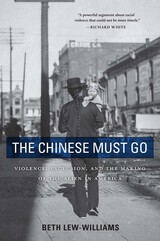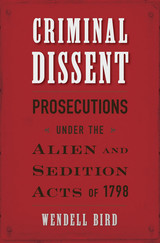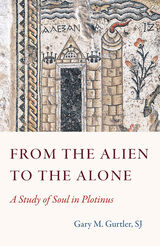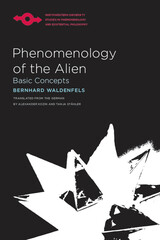
Winner of the Ray Allen Billington Prize
Winner of the Ellis W. Hawley Prize
Winner of the Sally and Ken Owens Award
Winner of the Vincent P. DeSantis Book Prize
Winner of the Caroline Bancroft History Prize
“A powerful argument about racial violence that could not be more timely.”
—Richard White
“A riveting, beautifully written account…that foregrounds Chinese voices and experiences. A timely and important contribution to our understanding of immigration and the border.”
—Karl Jacoby, author of Shadows at Dawn
In 1885, following the massacre of Chinese miners in Wyoming Territory, communities throughout California and the Pacific Northwest harassed, assaulted, and expelled thousands of Chinese immigrants. The Chinese Must Go shows how American immigration policies incited this violence, and how this gave rise to the concept of the “alien” in America.
Our story begins in the 1850s, before federal border control established strict divisions between citizens and aliens—and long before Congress passed the Chinese Restriction Act, the nation’s first attempt to bar immigration based on race and class. When this unprecedented experiment failed to slow Chinese migration, armed vigilante groups took the matter into their own hands. Fearing the spread of mob violence, policymakers redoubled their efforts to seal the borders, overhauling immigration law and transforming America’s relationship with China in the process. By tracing the idea of the alien back to this violent era, Lew-Williams offers a troubling new origin story of today’s racialized border.
“The Chinese Must Go shows how a country that was moving, in a piecemeal and halting fashion, toward an expansion of citizenship for formerly enslaved people and Native Americans, came to deny other classes of people the right to naturalize altogether…The stories of racist violence and community shunning are brutal to read.”
—Rebecca Onion, Slate

In the first complete account of prosecutions under the Alien and Sedition Acts, dozens of previously unknown cases come to light, revealing the lengths to which the John Adams administration went in order to criminalize dissent.
The campaign to prosecute dissenting Americans under the Alien and Sedition Acts of 1798 ignited the first battle over the Bill of Rights. Fearing destructive criticism and “domestic treachery” by Republicans, the administration of John Adams led a determined effort to safeguard the young republic by suppressing the opposition.
The acts gave the president unlimited discretion to deport noncitizens and made it a crime to criticize the president, Congress, or the federal government. In this definitive account, Wendell Bird goes back to the original federal court records and the papers of Secretary of State Timothy Pickering and finds that the administration’s zeal was far greater than historians have recognized. Indeed, there were twice as many prosecutions and planned deportations as previously believed. The government went after local politicians, raisers of liberty poles, and even tavern drunks but most often targeted Republican newspaper editors, including Benjamin Franklin’s grandson. Those found guilty were sent to prison or fined and sometimes forced to sell their property to survive. The Federalists’ support of laws to prosecute political opponents and opposition newspapers ultimately contributed to the collapse of the party and left a large stain on their record.
The Alien and Sedition Acts launched a foundational debate on press freedom, freedom of speech, and the legitimacy of opposition politics. The result was widespread revulsion over the government’s attempt to deprive Americans of their hard-won liberties. Criminal Dissent is a potent reminder of just how fundamental those rights are to a stable democracy.


With impressive erudition Waldenfels weaves in xenological themes from classical philosophy, contemporary phenomenology, literature, linguistics, sociology, and anthropology to address the boundaries of experience that unite and separate human beings, their collectives, their perceptions, and aspirations. While the debate has long raged in German-speaking circles, Waldenfels’s work is largely unavailable to the English-speaking audience, with the only other translation being The Order in the Twilight (1996). Phenomenology of the Alien is a superb introduction to both xenological phenomenology, and the the question of the alien as it has been unfolding in contemporary thought.
READERS
Browse our collection.
PUBLISHERS
See BiblioVault's publisher services.
STUDENT SERVICES
Files for college accessibility offices.
UChicago Accessibility Resources
home | accessibility | search | about | contact us
BiblioVault ® 2001 - 2024
The University of Chicago Press









